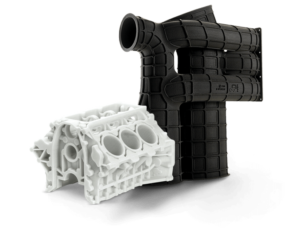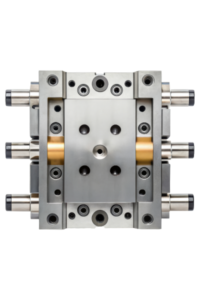The integration of Artificial Intelligence (AI) technology is ushering in a new era of innovation within the injection molding industry. By leveraging the power of AI, the injection molding process, which involves injecting molten plastic into a mold and cooling it to form the desired shape, is becoming increasingly automated, efficient, and precise. This is resulting in significant cost savings for manufacturers and improved product quality for consumers. The injection molding method is widely used in the production of consumer goods and automobile parts. The incorporation of AI technology is facilitating a more streamlined and cost-effective approach to this manufacturing process, ultimately benefiting both manufacturers and end-users alike.
AI is used in various ways in injection molding, as follows:
- Predictive Maintenance: AI predicts when a machine is likely to fail and schedules maintenance before any breakdown. It can reduce downtime and prolong the life of the machine.
- Quality Control: AI monitors the parts’ quality and adjusts the process as needed to ensure consistent quality.
- Process Optimization: AI is used to optimize the injection molding process by analyzing data from the machine. Then adjust your processes to improve efficiency and reduce waste.
- Material Optimization: AI is used to optimize materials’ use in the molding process. It, in turn, can save costs by reducing the material used and minimizing waste.
- Machine Learning: AI is being used to train machines to learn and adapt to new production processes. This allows high-speed and more efficient production cycles.
The integration of Artificial Intelligence (AI) into the injection molding process is revolutionizing the industry by elevating efficiency, precision and cost savings. One of the key ways that AI is impacting injection molding is through the use of intelligent sensors. These sensors collect data on molding-related variables such as temperature, pressure, and flow rate. The collected data is then analyzed by AI algorithms to identify patterns and potential issues. For example, if the temperature of the molten plastic is too high, the AI system can alert the operator and adjust the process to prevent defects in the final product. Another way in which AI is impacting injection molding is through the use of predictive maintenance. By using data from intelligent sensors to identify when a mold is likely to wear out or malfunction, the AI system can schedule maintenance before the mold fails, thus saving time and money. AI in injection molding thus enables more efficient and accurate manufacturing process.
Benefits of AI in injection molding:
The integration of AI in injection molding is revolutionizing the industry by introducing greater efficiency, precision, and cost savings. One of the most significant benefits of AI in injection molding is the ability to optimize the production process. By analyzing data from smart sensors, the AI system can identify the most efficient way to run the process, resulting in reduced scrap and improved efficiency.
Furthermore, AI is also being utilized to improve the design of products produced through injection molding. By analyzing patterns and trends in the data, the AI system can inform the design process, making future products more efficient, durable, and cost-effective.
Additionally, the use of predictive maintenance and the ability to detect and correct defects in the production process are other key advantages of AI in injection molding. By predicting when a problem is likely to occur, the AI system can schedule maintenance and take action to correct defects before they occur, ultimately saving time and money.
AI Molding Process Example:
The integration of AI in injection molding is revolutionizing the industry through automation and optimization of various processes. This includes the control of the temperature, pressure, and flow rate of molten plastic, which leads to greater efficiency and precision in the production of consumer goods and automobile parts. The use of intelligent sensors and predictive maintenance further enhances the capabilities of the technology, enabling the detection and correction of defects, as well as the improvement of product design. The result is a more streamlined, cost-effective manufacturing process that yields higher-quality products. As AI continues to evolve, the benefits it brings to the injection molding industry are expected to become even more pronounced.
About Quickparts
Quickparts offers a complete range of on-demand manufacturing services, from 3D printing to traditional manufacturing processes. Quickparts empowers its customers with the tools to reduce production times, speed up design iterations, and shorten product development lifecycles with high-quality 3D printed and machined parts from one of our seven global design and production centers. Quickparts’ U.S. facilities are ISO 9001:2015 certified and ITAR registered, with expert teams that have been producing parts for more than 20 years.


